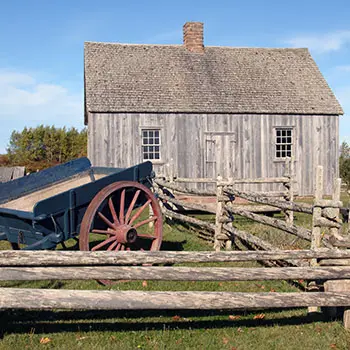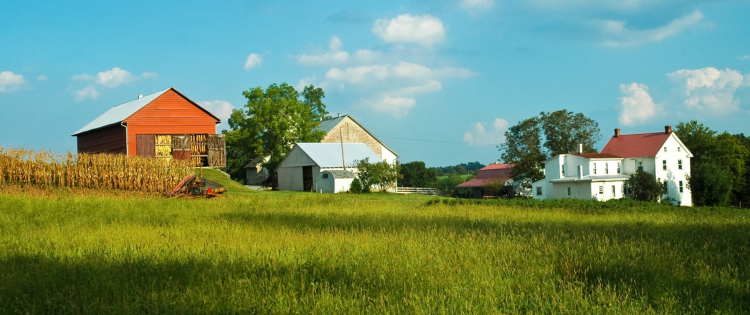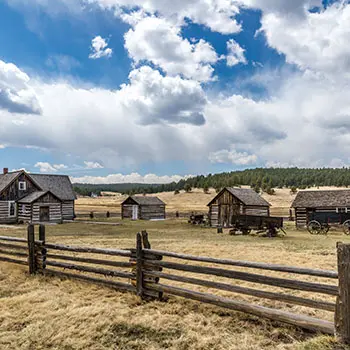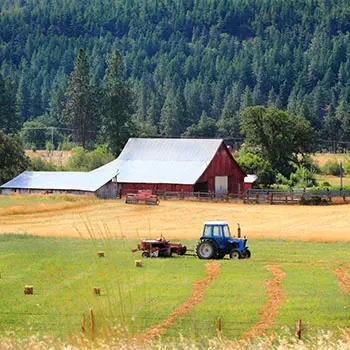Dreaming of living off the land but unsure whether to go for a homestead or a farm? You’re not alone! Many people in the homesteading world face this exact question. While both offer a chance to reconnect with nature, they differ in terms of goals, scale, and lifestyle. Knowing the difference between a homestead vs. farm helps you figure out which one fits your lifestyle better.
So, how do you decide which path is right for you? Don’t worry; we’ve got you covered! In this guide, we’ll break down the key differences between homesteads and farms to help you make the best choice.
Let’s jump in and explore!
What Makes a Homestead? 
A homestead is all about living simply and becoming self-sufficient. Homesteading is more personal than farming. It’s about providing for yourself and your family by growing your own food, raising animals, and staying closely connected to nature.
This lifestyle isn’t just practical; it’s deeply rewarding. For example, baking bread with flour you milled yourself or savoring fresh, homegrown produce brings a unique sense of pride and accomplishment.
What About a Farm?
A farm is where the land meets business. Unlike a homestead, which focuses on self-sufficiency, a farm is about growing crops or raising animals to sell and earn a profit. It’s less about personal needs and more about providing for the wider community.
Though it takes hard work and dedication, farming comes with its own kind of pride. It’s about feeding people, supporting local economies, and building something that grows far beyond the land.
Common Things
Homesteads and farms have a lot in common, like growing food, raising animals, and living close to nature. Both involve hard work and skills like planting, animal care, and fixing equipment.
They’re also great for health security because you know where your food comes from and can avoid harmful chemicals.
By being self-reliant, you’re less affected by shortages or price hikes. Whether it’s a big farm selling goods or a small homestead focused on self-sufficiency, both provide fresh, healthy food and a deeper connection to the land, which supports a more secure and sustainable way of living.
In addition to growing your own food and raising animals, having the knowledge to take care of your health without relying on doctors or hospitals can be a game-changer. This guide is by far my top choice.
I have had it for a while now and learned so much from it. Learning how to stockpile antibiotics without a prescription from here came in really handy when I needed it.
Homestead vs. Farm
Choosing between a homestead and a farm can feel like picking two sides of the same coin. They both offer the chance to work with the land, but their purposes and lifestyles are worlds apart. If you’re wondering which path fits your dreams, let’s break it down into the key differences that truly matter.
Lifestyle vs. Business 
Homesteading is all about providing for your family and having more freedom. You harvest crops or raise livestock because you love doing it. On the other hand, a farm operates more like a business. The goal is to produce crops or livestock to sell, which means it’s all about making money from the land.
Related: Veggies You Only Plant Once And Harvest Forever
While homesteading is often about personal freedom, farming brings a more structured, business-like approach. If you’re drawn to self-reliance, homesteading might be your perfect fit. However, if you want to make a living from the land, farming is where you must focus.
Hobby vs. Commitment
Homesteading can feel like a hobby at first. Maybe you start with a few backyard chickens or a small vegetable garden, and over time, you get into other aspects. It’s a slower-paced, flexible way of life that allows you to try new things without the pressure of deadlines.
Farming, however, is a serious commitment. It requires dedication, long hours, and constant attention to crops or livestock. Here, you’re not just growing food for your own table; you’re producing for a larger community. It’s a full-time job with plenty of challenges that demand your attention every single day.
Small vs. Large Scale
The scale is a big difference between a homestead and a farm. Homesteading usually starts small and often stays that way. You can expand over time, add more land, or try out new crops, but the overall size stays manageable.
Related: How To Store Your Food If You Don’t Have A Lot of Space
In contrast, farming is all about big numbers. Think of large fields of crops or livestock to care for. A farm usually covers a lot of land and requires more resources, whether it’s extra equipment or extra hands.
Diverse Activities vs. Focused Farming 
Life on a homestead is a rewarding adventure where you become a jack-of-all-trades. One day, you might be making homemade jams, and the next, you’re out harvesting fresh, delicious crops. It’s a lifestyle that keeps you busy, but in the best way, allowing you to develop various skills.
Now, we’re not saying you can’t develop new skills on a farm; after all, farming takes a lot of specialized knowledge. However, farming tends to focus more on mastering a specific area. Whether it’s crops, livestock, or something else, your work on a farm is usually centered around perfecting a particular skill or process.
Basic vs. Professional Equipment
Another key difference between homesteads and farms is the equipment you rely on. On a homestead, you start with the basics: maybe a small lawn mower, a shovel, and a trusty wheelbarrow.
In contrast, owning a farm means investing in high-tech equipment. Since the scale of farming is way larger and more demanding, you’ll need tools like tractors, harvesters, and irrigation systems to keep everything running smoothly.
Tax Implications: Personal vs. Commercial
One thing’s clear from the above differences: homesteading is all about personal fulfillment, while farming leans more toward the commercial side. Consequently, living on a homestead often means fewer tax concerns. Sure, you might pay taxes when buying land, but the tax situation is usually pretty straightforward when it comes to the produce.
On the contrary, once you run a business like a farm, things get a bit more complicated. You’ll likely have to navigate a variety of tax deductions and regulations. Farming is a business, which means dealing with more paperwork and tax strategies to keep everything running smoothly.
Homestead vs. Farm: Which Path is Right for You?
Before deciding whether to own a farm or a homestead, make sure to ask yourself the following questions:
- What’s Your Dream Life? Reflect on whether you want a self-sufficient life or a large-scale operation focused on profit.
- How Much Time and Effort Can You Commit? Homesteading allows for a more relaxed pace, while farming demands constant attention. Consider how much time you are willing to dedicate.
- Is Your Land Perfect for Your Vision? Not all properties are ideal for farming or homesteading. Ensure you have enough land to support the lifestyle you plan to build.
- Have You Considered Your Budget and Long-Term Goals? Farming often requires more initial investment and ongoing equipment costs. Be clear about your financial capacity and long-term plans.
To sum up, whether you choose a homestead or a farm, both paths come with their own unique rewards and challenges. The key to making the right choice lies in understanding your personal goals and lifestyle. So, take a moment to reflect and carefully consider your options. After all, the best decision is the one that aligns with your vision for the future.
Remember, it’s your journey; be sure to make it count!
Medicines Every Homesteader Should Stockpile
How To Make The Invisible Root Cellar (Video)
25 Crops You Can Grow In Buckets All Year Round
















